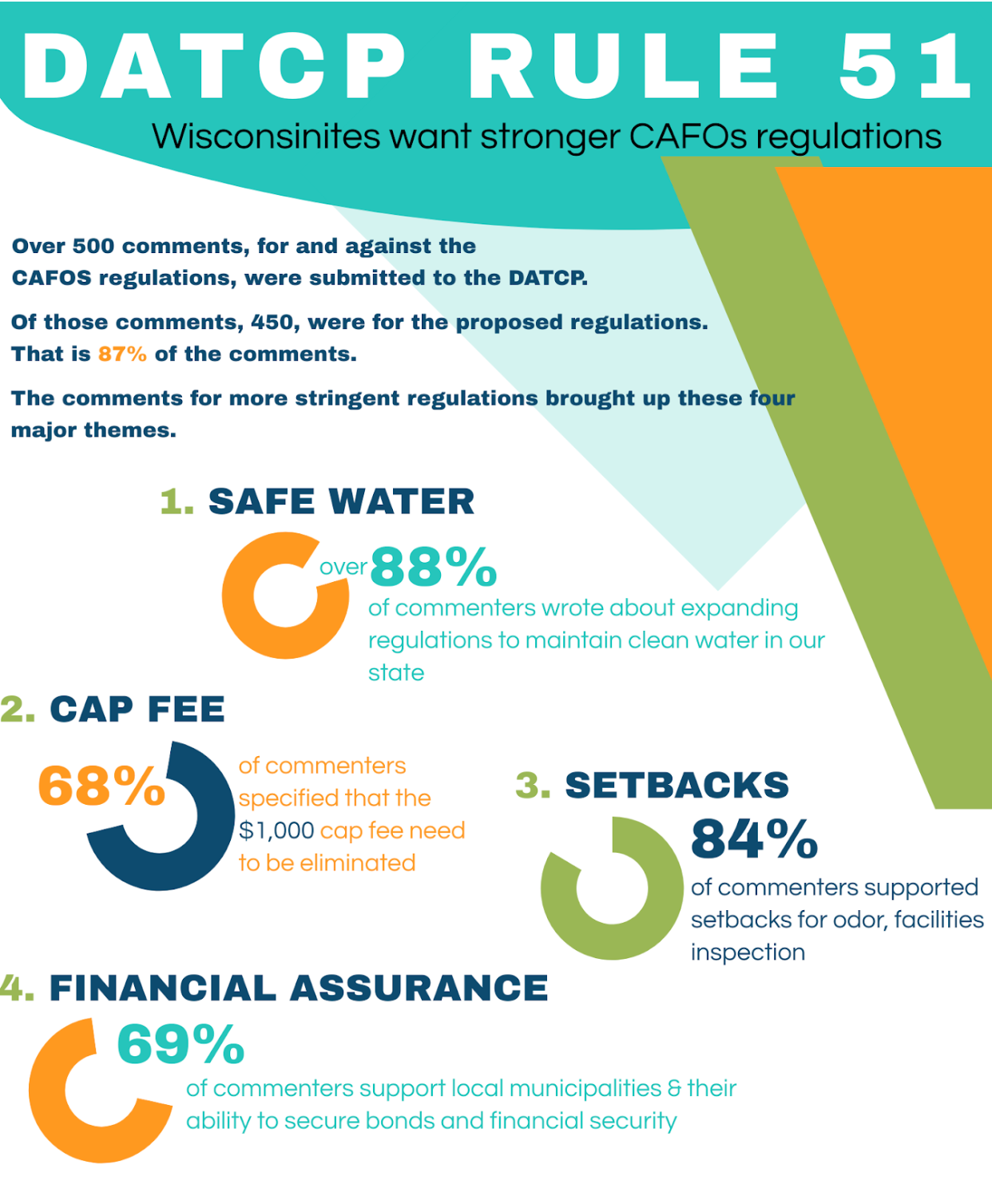“I’m tired of not having my voice heard… for our property, for the property of those whose lives are impacted by this CAFO. We need more oversight. We need a seat at the table. We need our voices to be heard… NOW.” -Commenter
The agriculture business in Wisconsin is of a bounty. An easy drive outside of our major cities will lead to you our farmlands. But what exactly are these agriculture entities, and how do they impact our environment?
In Wisconsin, there are more than 1,000 concentrated animal feeding operations (CAFOs). A CAFO is defined as a farm with more than 1,000 animal units. Pollutant discharges from CAFOs pose numerous threats to our environment and communities. These discharges include hazardous chemicals like methane and ammonia, which are released into our air and contaminate our water. CAFOs keep their manure and after a six month period spread it on farm fields for disposal. Faulty manure management is one of the leading causes of surface and groundwater contamination in the United States.
CAFOs in Wisconsin are regulated by the Department of Agriculture, Trade and Consumer Protection (DATCP). More specifically, the Livestock Facility Siting Administrative rule (also known as DATCP Rule 51), allows local municipalities to provide local regulation over CAFOs. This rule is currently under review by a committee which decided on proposed revisions, including tighter regulation on manure storage structures and requiring CAFOs to adopt odor management plans. The proposed revisions, however, do not necessarily have direct revisions for the current $1,000 permit, financial assurance if the CAFOs goes bankrupt.
The public comment period for the proposed revisions has closed, but it brought forth communities and organizations that pushed together for stronger revisions and opponents against the revisions. More than 500 comments, for and against the regulations, were submitted to the DATCP. Of these comments, 450 comments, 87%, were in support of the proposed regulations. The sheer number of comments submitted illustrates the need for and popularity of CAFO and animal farming regulation in Wisconsin.

Of the pro-regulation comments, 88% called for stricter regulations to protect water quality. Commenters demanded that CAFOs install water treatment facilities to discharge contaminated water and conserve groundwater. In one particular comment, a commenter wrote about a 275,000 gallon manure spill at Emerald Sky Dairy that contaminated the water they drink. Over 8 million gallons of contaminated water was spread on fields and 3,455 tons of solid manure were removed from nearby wetlands. Because of the spill, e. Coli was found in private wells of the surrounding community.
“I remember when I could make fresh lemonade and not have to worry if the water I used was safe to drink.” - Commenter
Commenters also discussed their personal distress about airborne chemicals and odor problems. CAFOs discharge more than 180 chemicals into the air, including the greenhouse gas methane. And still, families who reside near CAFOs live with the smell of manure on a regular basis. One commenter wrote that after a nearby CAFO expanded their farm, they can no longer open their windows on sunny days and do not leave the house when the CAFO’s stench is the strongest. Commenters also noted that CAFO smells negatively impact outdoor family events and have led to decreased property values.
The juxtaposition of CAFOs and smaller farms and financial assurance were also prominent themes in the comments. Of the pro-relegation comments, 69% of commenters called for CAFOs to have financial assurance. Owners of small, family-owned farms discussed the economic distress caused by CAFOs. When CAFOs go bankrupt, local municipalities are the ones that have to absorb the cost. Commenters highlighted the need to increase permit fees and require CAFOs to have financial backing in case their farm goes under.
The proposed revisions from DATCP need to include protections for our water and air. Everyone should be able to breathe clean air and drink clean water – without contamination from CAFOs. Not having strict regulations that protect our water and air from CAFOs will only lead to more disheartening and aggravating stories from our state. We should not be afraid to spend time together on a sunny day because of the daily manure stench. Nor should we constantly fear that a drinking well is contaminated from a nearby CAFO. The Livestock Facility Siting Administrative rule must include protections for our environment and communities.
Thank you to everyone who submitted comments! We need to pressure our state legislators and DATCP over the Livestock Facility Siting Administrative rule to impose more stringent regulations to protect our environment, communities, and our future. Thank you for making your voices heard!
Written by Sarah Kear, Organizing Project Aide with the Sierra Club John Muir Chapter.
Thumbnail photo courtesy of Chesapeake Bay Program.